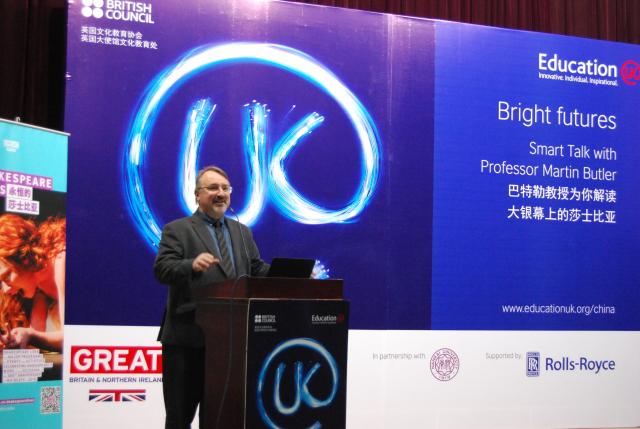On March 18, “Smart Class” seminar, jointly sponsored by British Council, the Cultural Division of the Embassy of the United Kingdom, and CFL of Nankai University, was held at the Reporting Hall of Boling Building of Nankai University.
The main speaker was Shakespeare expert Martin Butler, who is also a research fellow of British Academy, and professor of Leeds University.
The title of the speech was “Bright futures: Smart Talk with Professor Martin Butler”. The speech attracted about 200 audiences, most of them were students from English Department of CFL, and some of them were volunteer Chinese teachers for Asia, Africa and America, sponsored by Confucius Institute Headquarters. Professor Ma Hongqi, assistant dean of CFL, also attended the seminar.
Professor Martin Butler reflected the historical development of Shakespeare plays from the renaissance to the Second World War and to the present society, and the social background on which Shakespeare plays were adapted into films. British art experienced a depression after the Second World War, and in order to develop and strengthen British art, Shakespeare plays with their 400 years’ development have been pushed forward again. Shakespeare plays have been protected and resurrected, and adapted tentatively into films.
The film Henry V was the first successfully adapted Shakespeare play. After that, there were many versions reshot by different film companies, each of which reflected peoples’ thinking and concerns at that time. With the acceptance of the adapted Shakespeare thematic films, the content of Shakespeare plays were also adapted into the films within the present social background. Take Romeo and Juliet as an example, with Leonardo DiCaprio acting the leading role, it was a recreation of Shakespeare plays within the present social background. In the film, Romeo and Juliet could not get married, not only because of feudal hatred, but also because of their different race and different social classes, which made the film and the present social background bundled closely together.
At present, dramatic elements of Shakespeare plays have been globalized and more and more non-Western countries have utilized Shakespeare elements into their own films, such as Japan, Thailand, and India etc. Within the historical development, Shakespeare plays have been revised, merged, translated, and even put in new elements, but they are always precious treasures in the global cultural world.
Although the new interpretations of Shakespeare plays by those modern films cannot take place of the play on the stage, they do make the audience know more the ideas that the plays aimed to transfer. Each film created its own convenience for the transmission of Shakespeare soul and made it meaningful in the daily new world.
During the interactive question time, Martin shared his own experience with the audience. Within the two-hour speech, Martin had led the audience to experience the dramatic soul of Shakespeare plays and feel that modern films really transferred some essential elements of Shakespeare plays.
It is said that 2016 is the 400 anniversary of the death of Tang Xianzu in China and Shakespeare in England. British Council will offer serial speeches on Shakespeare for the audience in Beijing, Tianjin, Shanghai, and Hangzhou. The speech in Nankai University is part of “2016 Smart Classes” sponsored by British Council.



